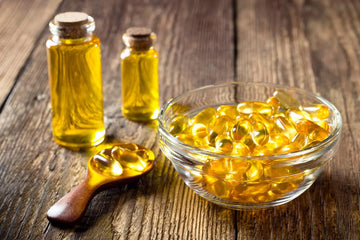Most of us want to stay in pretty good shape. From hitting the gym to enjoying the beautiful outdoors, staying healthy is a top priority for many individuals of all ages. A daily multivitamin ensures we get all those essential nutrients our body lacks. However, it's possible that you might have found an old bottle of multivitamins many times and wondered, "Have these tablets expired?"
With another thought clouding your mind, can I still use these expired tablets? It's a common question, and there's no need to be embarrassed about these queries popping up in your mind. It's a genuine thought; you want to ensure you get the most out of your multivitamins.
If you are having similar thoughts, we have you covered. This blog post covers everything you need to know about multivitamin expiry.
How Long Can You Expect Multivitamins to Last?
When you pick up a bottle of multivitamins, you will always see a date printed on the label. This isn't usually a strict expiration date, as you will find it in fresh milk or meat. Instead, it is a "best before" date.
So, what does a best-before date actually mean for your multivitamins? The manufacturer tells you that until this date, the multivitamin should be at its peak quality. It means that all the vitamins and minerals listed on the label are expected to be present at their stated strengths until the date they have mentioned. The tablets or capsules won't be discoloured, crumbly, or have an odd scent.
Factors that Affect the Shelf Life of Multivitamins
Multivitamins aren't manufactured to last forever. Just like many things, they can lose their potency over time.
However, several factors affect how long your multivitamins stay in a perfect state. By understanding these elements, you can keep your supplements in a better state:
The Type of Multivitamins
Some vitamins, like Vitamin C and many B vitamins, like B1, B6, B9, and B12, are sensitive. They can degrade quickly when exposed to environmental factors. However, fat-soluble vitamins like vitamins A, D, E, and K tend to be more stable, though they do not degrade easily. Minerals like calcium, iron, and zinc are generally stable compounds that don't break down like vitamins.
High Temperatures
Heat or high temperature is the biggest enemy of supplements. High temperatures speed up chemical reactions, causing the active ingredients to break down faster. Leaving the bottle of your vitamin or mineral supplements near a sunny window, next to a hot stove, or worse, in a scorching car can significantly shorten its lifespan.
Direct Sunlight
Keep your multivitamins away from direct sunlight and UV light. These can destroy specific vitamins or minerals in these supplements. Protecting your tablets or capsules is one of the main reasons many multivitamin bottles are dark or opaque. Their bottles are usually designed to protect the contents from light exposure.
Moisture and Humidity
Water vapour in the air can cause vitamins to degrade, clump together, or even break down chemically. Think about how a damp cracker goes soft over time. Multivitamins can usually experience the same. Therefore, keeping the lid tightly sealed is vital to keep these supplements in a better state.
Air Exposure
Exposure to air can also cause some multivitamins to break down. We understand that you would like to keep your multivitamins protected. It can be done by keeping the lid tightly closed after each use to preserve your supplements from air exposure.
Packaging Matters
Good packaging is designed to protect your multivitamins. Airtight seals, dark bottles, and sometimes little moisture-absorbing packets known as desiccants inside the bottle help extend the shelf life.
Supplement Formulation
The multivitamin formulation also matters. Manufacturers use special coatings or inactive ingredients to help stabilise the vitamins and protect them from breaking down. A well-formulated multivitamin, such as those from iCare Naturals, is designed to maintain potency and quality up to its "best before" date.
What are the Best Ways to Store Multivitamins
Proper storage is essential to ensure your multivitamins stay effective for as long as possible. You must store them in a cool, dry place, away from direct sunlight. Here's what you can do to store your supplements:
Avoid Bathroom Cabinets
Showers make your bathroom steamy and humid, which is terrible for vitamins. The fluctuating temperature and moisture can speed up their breakdown. So, ensure you do not keep your multivitamins in the bathroom cabinets to keep them in a better state till the expiry date.
Avoid Kitchen Counters
Find a cooler spot if your kitchen gets warm from cooking or direct sunlight falls on your kitchen counters. Direct sunlight can impact the longevity of your multivitamins.
A Pantry or Cupboard is Ideal
A dark, cool cupboard or pantry is usually the perfect spot for your multivitamins. It protects them from light, heat, and moisture. Many multivitamin manufacturers recommend keeping your supplements in a cool and dry area.
Keep Lids Tightly Sealed
Every time you take a dose, ensure that the lid is twisted back on tightly. This keeps out air and moisture, which are major enemies of vitamin stability.
Do Not Refrigerate
Most multivitamins do not need to be refrigerated. Taking them in and out of a cold environment can bring moisture inside the bottle, precisely what you want to avoid. Only refrigerate if it's mentioned on the product label.
Original Container is Best
Don't transfer your vitamins to another container unless it's designed explicitly for supplements and offers the same protection from light and air. The original bottle is usually manufactured for the best preservation.
Moreover, always check the label on your specific multivitamin for storage instructions to keep your multivitamins effective throughout their intended shelf life.
Side Effects of Taking an Expired Multivitamin
The most common side effect of taking an expired multivitamin is that it won’t work. You will get fewer nutrients from those tablets or capsules. However, there are a few other things to be aware of, particularly if the multivitamins have been poorly stored or are very old.
Minimum Benefits: Some multivitamins get degraded to the point where they offer little to no nutritional benefit. You might continue to feel fatigued or notice the symptoms you were trying to address because you are not getting adequate nutrient support.
Digestive Upset: In some situations, the inactive ingredients, like supplement coatings, degrade due to extreme heat or moisture. Expired tablets may cause mild digestive problems for some sensitive individuals.
Unpleasant Taste or Smell: Multivitamins can develop an off-putting smell or taste. While not dangerous, it certainly isn't pleasant and is a clear sign that the product has gone past its best.
Contamination if Stored Poorly: If a multivitamin bottle has been exposed to extreme moisture over a long period, or you have stored it in a fridge, there's a chance that mould could grow, especially if the lid of the product wasn’t tightly closed.
Conclusion
Multivitamins expire, but they generally don't become harmful. However, their potency may drop significantly after the best-before date, which means you do not get the full nutritional benefits they promise. Factors like high temperature, sunlight, humidity, and even the type of vitamin significantly affect how quickly they lose their power.
You must pay attention to the expiry dates, store your vitamins in a cool, dry place, and keep the lid tightly sealed. You can always choose reputable brands like iCare Naturals that prioritise quality and proper formulation. However, a slightly "expired" multivitamin won't typically make you sick, but it won't deliver the full benefits you're hoping for. Understanding how you buy and store supplements can support your health and help you live your best life.




